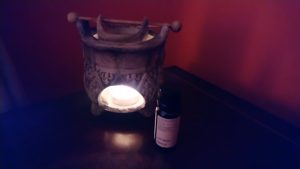


Asthma and Lavender
Asthma and lavender use to alleviate its symptoms is a well-known recommendation of western herbalists. I chose to try this out myself.

Asthma and lavender treatment with an oil burner
Earlier in the year, I had a mild viral chest infection. I was able to fight this off with rest and taking a bit of extra care of myself by eating well and sleeping more and cutting back on work a bit. However, after all the other symptoms had resolved, I was left with a continuing shortness of breath. Unusually, this was not accompanied by wheezing, and I was producing no phlegm. I concluded that my airways were inflamed following the virus.
As an asthmatic, I always have a blue inhaler to hand, although thankfully except for when something triggers an acute immune response, I can go months without needing to use it. Over the years, I have used diet, exercise, lifestyle, and of course acupuncture to manage my asthma and leave me largely symptom-free. Although, as I said I always make sure I have a blue inhaler with me, and all asthma sufferers should do likewise.
Two weeks had gone by since the chest infection, and there was no improvement in my shortness of breath upon even the mildest exertion. I was using my blue inhaler several times a day, and I was considering visiting my GP and thought I might even need a short course of steroids.
I decided to try some aromatherapy. I did some research and spoke to a knowledgeable man in my local herbalist shop and came up with a short list of a few possible oils. In the end, I bought some eucalyptus, which I like the smell of, and lavender, which I don’t particular like the smell of.
That night, I chose to try the lavender and left it burning safely in a oil burner lit by a night-light in the bedroom overnight. I took care to make sure that it was safe to do so and that there was sufficient oil and water so that it would not burn dry overnight. The night-light is held in a secure place (see picture) and cannot cause any damage.
The following morning, I immediately felt a frankly massive improvement in my symptoms. The breathlessness was almost completely gone, and I did not have to reach for my inhaler as I had for the previous two weeks upon awaking. That day, I took three puffs on my inhaler, as opposed to approximately twelve the day before. The following day, I took two puffs, and the day after I was able to go for a run for the first time in nearly three weeks.
So my experience of asthma and lavender seemed to be very good, and I do intend to use it again when I have a flare-up in symptoms and as a preventative when I am going to be exposed to irritants that I know can make me asthmatic, such as damp weather and dust.
Western herbalism has long advocated its use for asthma. Chinese herbal medicine in contrast does not view lavender as a particularly important herb, although it is understood to circulate in the lungs and the chest. With regard to western medicine and clinical trials, the jury seems to be out. Some studies seem to clearly indicate that it has effective anti-inflammatory properties, but there have been other studies that have indicated lavender and other oils can contain compounds that may cause breathing difficulties.
I can say that I found it extremely beneficial for my asthma symptoms on this occasion and intend to use it again. Like all medicine, it may be that it will be beneficial for some people and less so or possibly even detrimental for others.
For more news and information click here.
To find out more about asthma and lavender and more important information about the condition, go to the Asthma UK website.
To find out more about potential health benefits from nutritional choices, here is an article about the health benefits of turmeric.


